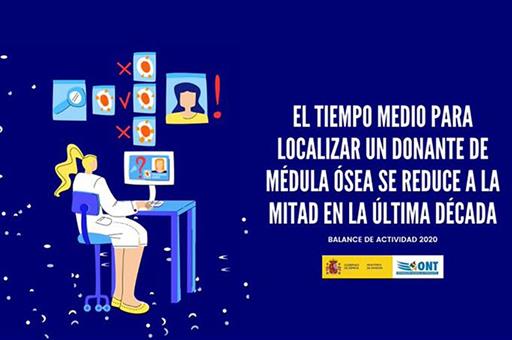Spanish National Transplant Organisation presents results from last year's activity
Average bone marrow donor search time halved over last decade
News - 2021.4.21
A total of 3,375 transplants of haematopoietic progenitor cells (HPT) - or blood stem cells - were performed over the last year, which are obtained from bone marrow, peripheral blood and umbilical cord blood (UCB). Of those, 2,049 came from the patient themselves (autologous transplants), while 1,326 were obtained from a donor (allogeneic transplants). In spite of COVID-19, only 69 fewer transplants were performed in 2020 than in 2019 (down 2%). In other words, activity by the programme was successfully maintained thanks to a major effort from healthcare professionals, all the centres involved and the protocols put in place by the National Transplant Organisation (Spanish acronym: ONT), the regional governments and the Josep Carreras Foundation, which has been managing the Spanish Register of Bone Marrow Donors (Spanish acronym: REDMO) since 1994 following the first Framework Agreement between this organisation and the Spanish Ministry of Health via the ONT.
At the peak of the epidemic, especially during the first wave, the Spanish Guardia Civil provided assistance to ensure that haematopoietic progenitors could reach their destination. Its help at airport entry and exit points was fundamental. Similarly, transplant teams were able to delay certain procedures thanks to the option of freezing these products, allowing them to be preserved in suitable conditions until the transplant was possible.
Spain has 64,638 units of UCB, 8% of all such units stored worldwide (799,770) and has the largest register in Europe and the third largest in the world behind the United States and Taiwan. In 2020, 115 units of UCB were sent for transplants in 17 domestic patients and 98 for foreigners. In the 23 cases of non-related transplants that took place in Spain, UCB donated to public blood banks was used. However, UCB transplant activity has gradually slowed over time due to the development of other types of HPT.
Last year's data show that HPT activity in Spain has continued to increase, growing by 33% over the last decade. Allogeneic transplantation has increased by 53% to the detriment of haploidentical transplantation and transplants from unrelated donors increased by 15%. Thanks to all these donation options, it can thus be stated that all patients who need a transplant have access to a suitable donor.
One out of every four donors now comes from REDMO
At the close of the year, 431,703 donors in Spain were registered with the REDMO. Thanks to them and in spite of the pandemic, 220 donations were performed in 2020 (221 in 2019). 30,631 new donors joined the register over the course of 2020. The average age of the donors registered with the REDMO is 33 and the average age of the donors who joined the register in 2020 is 29. 53% of available donors are under 40.
REDMO forms part of an international network of registers that enables the best possible donor for each patient to be found as quickly as possible, although attempts are always made to prioritise national donors for logistical reasons.
Thanks to this union, there are now almost 38 million donors registered worldwide. In absolute terms, Spain remains fifth on the European ranking of registered bone marrow donors, behind Germany, Poland, the United Kingdom and Italy.
Last year, 26% of all unrelated donors came from the Spanish register. This increase facilitates the logistics and improves the sustainability of the Spanish system and is one of the objectives for the Spanish National Bone Marrow Plan. When the plan was launched, this percentage was only 4%.
In terms of activity by Spain with other territories, Spain received haematopoietic progenitors in 2020 from such distant countries as Argentina and Australia, and also sent haematopoietic progenitors to places as far away as Chile and New Zealand.
Two donors per patient are found
In 2020, 920 new unrelated donor searches were undertaken for Spanish patients. 1,460 compatible donors were found for 786 patients, which is almost two donors per patient. Over the last decade, the average time to find a donor has fallen by approximately 50% and now stands at 26 days (48 days in 2010).
The Spanish National Bone Marrow Plan was launched in 2013. Since then, the Spanish Ministry of Health and the regional government authorities have made a significant economic effort to develop the plan. The success of this programme stems from joint endeavours by the ONT, regional governments, healthcare professionals, scientific bodies, the Josep Carreras Foundation and patient associations. However, none of this would be possible without the donors themselves - to whom we owe a debt of gratitude - who altruistically make donations to help patients in need.
Non official translation





